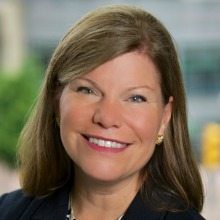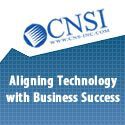
Annette Rippert, a senior executive who leads cloud and mobility services at Accenture Federal Services, talked about digital government, STEM programs and federal agencies’ access to a 24/7 society in a recent interview with WashingtonExec.
Rippert said the opportunity digital technology presents and its importance to the federal government is significant. Today, she said, it drives many things: how people connect with their friends on social media channels; how businesses connect to suppliers and customers; and how Accenture connects to its clients and employees.
It represents a significant shift toward accessibility of information, whether it lies in the digital world or relates to information surrounding assets or physical resources, said Rippert.
“That gives government agencies plenty of opportunity to use information to change the way that they support us as citizens, their interaction with other agencies or the commercial industry itself,” Rippert said.
Accenture Federal Services, based in Arlington, Va., is a wholly-owned subsidiary of Accenture LLP — a global management consulting, technology services and outsourcing company, with approximately 289,000 employees in more than 120 countries. Accenture’s federal business serves nearly every cabinet-level department and 20 of the largest federal organizations with clients at defense, intelligence, public safety, civilian and military health organizations.
Rippert has a long history with the company, spending more than 18 years at Accenture’s commercial practice and in the last few years, focusing on its federal practice. She said the biggest change she’s seen over the years is happening now and involves the pace of innovation.
“There is an opportunity to make a dramatic impact not only in the way we live, work and interact, but also in how government agencies are now looking to transform their own agencies, from complex, stovepipe bureaucracies to a more agile, citizen-centric, efficient, innovative organization,” Rippert said. “I am personally very excited about the prospect of how digital technology can help move agencies toward a future model of digital government.”
“He taught me the importance of setting a goal or a vision for yourself and to take a long view as you look at the progression of each and every day.”
Rippert said she’s also excited about the company’s published comparative study of digital government performance on a global basis. The company looked at 10 different countries around the world and studied the various ways they are using digital technology today, she said.
“That’s part of my work,” she explained. “We are investing our research and development efforts to understand how we best apply emerging technologies to address problems that we see in our federal clients’ organizations. We’re bringing innovation and cost-effective solutions for delivering the vision of the public service of the future. It’s something that I’m working on every day. I think the opportunity is significant.”
Rippert also addressed how federal agencies can take steps to become digital and create a 24/7 society. She suggested four ways to categorize this.
The first is around digital public engagement, she noted, explaining a survey that Accenture recently conducted where 81 percent of respondents said they would like their government to provide more services through digital channels. Rippert spoke about the importance of connecting and engaging citizens, businesses and agencies via website modernization, social and mobile channels, improved search functionality for data open to the public and an overall expansion of digital platforms.
The second aspect surrounds digital citizen services, she said. “We as citizens interact online with retailers, banks, insurance agencies and more, and we’ve become accustomed to this idea of being able to digitally engage with commercial enterprises and connect 24/7 on mobile devices,” Rippert said.
“When we think about our federal government, those same channels should be enabled, to allow agencies to communicate securely serve their citizens. That helps drive down costs and creates a more personalized channel between the citizen and the agency.”
Third, said Rippert, is digital employee collaboration. Many enterprises today have moved to incorporate collaboration channels and knowledge management tools into the enterprise, she said. “We’re beginning to see our federal customers begin to move in that direction as well. I think that’s an important step toward moving the agency itself into that 24/7 type of model,” she said.
Lastly, Rippert listed digital agency collaboration. It’s the way agencies collaborate with one another to create a “one-government” program with agencies partnering and integrating with each other, she said, adding that from a citizen’s standpoint that creates a virtual single door for the citizen to interact with government. That’s a tall order because it requires collaboration and interagency cooperation on the backside, she added.
“I think the technology can be very powerful,” said Rippert, who was drawn to her current field because she enjoyed math and science in grade school.
“I am personally very excited about the prospect of how digital technology can help move agencies toward a future model of digital government.”
In college, she studied computer science and electrical engineering. There were very few women in the program then, she said. Rippert spent her college summers working to build network control applications and as she finished her degree, knew that she wanted to have a bigger impact than engineering systems at a technical level.
“I wanted to apply my understanding of technology to solve business problems,” Rippert said. “That brought me into the world of technology consulting. Today I manage our technology resources and offerings. We are continually looking for ways to implement new technologies and bring new skills to increase the value of what we do for our clients in a unique way.”
In December 2013, Accenture Digital launched.
“It’s a new part of our organization that is aggregating our industry leading digital marketing, analytics and mobile services from across all of our industries into one organization,” Rippert said. “That was pretty powerful for us because it brought together all our resources that are working across the emerging areas of digital into one group of 23,000 professionals.”
Rippert said when serving federal customers she is able to reach out to Accenture Digital to draw the very best of a particular skill area when needed. Many of those top resources are now working to help Rippert in federal and across the company’s health and public service practice to integrate digital technologies and define how to best deliver digital government for the future. Accenture also has a program called “Future Technology Leaders” — a global effort to support undergraduates with an interest in STEM-based careers. Accenture has taken students who hold STEM-related degrees and teamed them with more than 35 universities in more than 20 countries, Rippert said.
She added that from her vantage point, there’s significant progress toward equity in the number of men and women entering STEM careers today. Programs like “Future Technology Leaders” help to support that progress.
“Opportunities are wide open for anyone interested in that career field, man or woman. I would encourage anyone with an interest or an aptitude in those areas to focus their endeavors there,” she said. “They are certainly rewarding careers and the pace of technology will only continue. It represents a significant opportunity for anybody with skills in that direction.”
And, she noted, the recruitment of women and minorities is not something that is new to Accenture. Creating a diverse workforce is an important part of the way the company approaches the market and brings talent into the organization.
“From an industry perspective the program provides a chance for people like myself to share insights with students, and provide perspective into what a future career would look like if they invested their interests in a STEM-related field. Frankly, we need that talent to continue to grow at pace with the rest of the world,” Rippert said.
“I wanted to apply my understanding of technology to solve business problems. That brought me into the world of technology consulting.”
Rippert also serves on the McCormick Advisory Board for the School of Engineering at Northwestern University, outside Chicago. Northwestern is one of the top engineering programs in the country, said Rippert, and Accenture sources a lot of talent from there. She said she chose to invest her time with Northwestern because of the opportunity to get a glimpse of some exciting university research that goes on in their school of engineering. Rippert said it also allows her to provide input on shaping the types of skills that Accenture and similar organizations need.
“I find it a rewarding exchange.” Rippert said.
She also provided an update on Accenture’s work on the healthcare.gov contract.
Accenture Federal Services was hired by the Centers for Medicare and Medicaid (CMS) to continue making improvements to the Healthcare.gov website, she said, noting that the company is known for taking on some of its clients’ most complex and mission-critical assignments and getting the job done. This is a similar situation, she said, adding that in the United States alone through Accenture’s federal, state and local business it has successfully worked on more than 1,000 government contracts and task orders in Fiscal 2013.
“We have long-term relationships with some of the world’s leading companies and our clients value our ability to deliver,” Rippert said. “The quality of our work has been recognized through strong ratings, references, industry analyst rankings and more. It is our focus on quality that helps us to be successful in such engagements.”
And for Rippert, she takes inspiration from people she encounters as her career continues. One person who inspired her was actually a client.
“He taught me the importance of setting a goal or a vision for yourself and to take a long view as you look at the progression of each and every day,” she said.
And she likes to think of her career, clients and relationships within Accenture as long-term investments.
“It’s a particular way of looking at setbacks and achievement,” she said.” …When you continue to focus on that end goal, then each of the steps taken day in and day out begin to make sense in context of the long view. That client had a very big impact on how I think about my professional life and long-term goals..”


